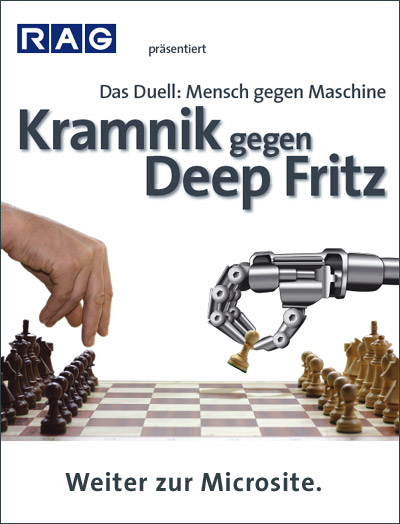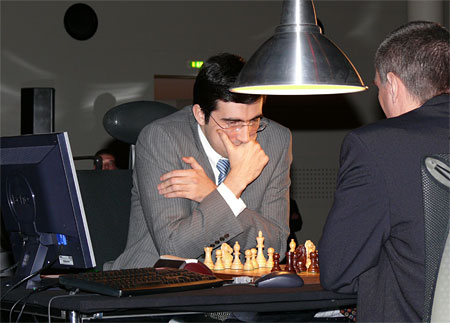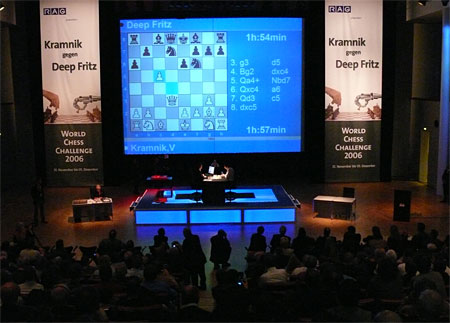| |
 |
[ กลับหน้าหลัก ]
ศึกระหว่าง Kramnik - Deep Fritz @ [Man-Machine]
รายการพิสูจน์ศักดิ์ศรีของมนุษย์และเครื่องจักรเริ่มขึ้นแล้ว
ระเบิดศึกระหว่างตัวแทนของมนุษย์ Kramnik แชมป์โลกคนล่าสุด
กับตัวแทนของเครื่องจักร Deep Fritz โปรแกรมที่เก่งที่สุดขณะนี้
เป็นรายการปะทะระหว่างสุดยอด Man-Machine
ชิงเงินรางวัล 1,000,000 US ( 1 ล้าน US ประมาณ 40 ล้านบาท)
การแข่งขันระหว่าง Kramnik - Deep Fritz
จะเริ่มวันที่ 25 พ.ย.- 5 ธ.ค. 2549 ที่ Bonne, Germany
เข้าไปชมใน website ได้ที่นี่
http://www.rag.de/microsite_chess
แล้วคลิกเข้าไปที่หน้าแรกได้เลยนะครับ
งานนี้ในฐานะที่เป็นมนุษย์คนหนึ่ง ขอเชียร์ Kramnik นะครับ 
|
โดย : PE39  [ 21/11/2006, 16:11:06 ] [ 21/11/2006, 16:11:06 ] |
|
1

ศึกชี้ชะตาของมวลมนุษยชาติ
|
โดย : PE39  [ 21/11/2006, 16:14:07 ] [ 21/11/2006, 16:14:07 ] |
|
2
Computer Chess Man and Machine.
A Journey Through History.
Garry Kasparov stumbled off the stage. He just wanted to escape the scene of one of the most bitter
defeats in his career. "While I played as best I could, the machine played beautiful, flawless
chess. For the first time, I could feel I could smell a new kind of intelligence across the
table," he said later. After their victory, the developers of supercomputer Deep Blue agreed in
their excitement: "That wasn't computer chess. That was human chess."
Did this day in April 1997 mark the beginning of a new era in the confrontation between man and
machine? A 1.4 ton silicon colossus, able to calculate 200 million times faster than a human being,
had crushed him like a boa constrictor the rabbit. The reigning World Champion, who had defended his
title for 12 years, had squared off against the mechanical beast to defend "the honor of the
human race" (Kasparov). The initial win filled him with jubilation that his human intuition,
his far-seeing strategy proved to be superior to brute force computations. Until the second game. It
was almost like Bobby Fischer or Anatoly Karpov had been hidden in the machine. Kasparov said,
"After the game, I was exhausted, while the computer didn't even know if it had won, lost or
drawn! For the first time, I played an opponent who didn't succumb under my pressure. I could
hardly sleep afterwards. The machine, however, never suffers. You turn it off, and that's it."
This match, which the computer eventually won by a hair, marked the turning point in the fascinating
back-and-forth between man and machine, between grey cells and silicon chips, between brilliant
intuition and brute force. The computer did the only thing it could: to tirelessly, mindlessly and
patiently churn through a lagoon of data sludge for hours on end. And though 99.999 percent of its
haul was garbage, it used the remainder to play a crisp, coherent game. "Quantity became
quality," said Kasparov. "Artificial stupidity" became artificial intelligence; a
bozo became Deep Blue. From then on, Kasparov looked up to computers like more advanced beings in
contrast to Stephen Hawking: "Computers show no sign of intelligence. Our present computers are
less complex than the brain of an earthworm."
A normal game of chess consisting of 40 moves can have 1.5 x 10128 different permutations far more
than the number of atoms in the universe. If every atom in the universe were a supercomputer capable
of calculating one million positions per second, and each one of these computers had begun their
calculations at the same time as the universe began 15 billion years ago they would only have
reached the 31st move by now. That means Deep Blue, with its 200 million positions per second, is a
poky tortoise who only scratches the surface. Moreover, it lacks the intuition that allows painfully
slow human beings to look far ahead in their long-term strategic decisions.
In a sense, everything began with the great-grandfather of all modern chess computers and programs:
the Turk. This first "chess automaton" was a cabinet topped by a chessboard behind which a
"Turk" sat, performed the moves, nodded three times for every mate, and shook his head
roughly if his opponent made a false move. The automaton was unveiled in 1759 by its inventor,
Johann von Kempelen, at the court of Austrian Empress Maria Theresa. Over the next several years,
the Turk toured Europe, causing a sensation wherever it went. It almost always defeated its
opponents including Napoleon at a match in Castle Schönbrunn in 1809, and American
statesman and inventor Benjamin Franklin, a passionate chess player who had penned a monograph
entitled "The Morals of Chess". While some believed the Turk was a hoax, no one discovered
its real secret; even Edgar Allen Poe was only half-right. When the cabinet was opened up, it
appeared to be crowded with levers, pinions and wheels. In reality, the interior of the ingenious
contraption held a dwarf chess master who devised and carried out the moves.
However, the question of whether machines could actually think was first posed in the '50s by
British computer scientist Alan Turing. If independent observers could no longer tell which
"answer" came from a human and which came from a machine, it had to be considered
"intelligent". And the medium par excellence was and remains chess the "touchstone
of the intellect" (Goethe). With clear rules, a fixed framework of 64 squares and 32 pieces, a
clear goal (checkmate) and verifiable results. After World War II ended, Turing wrote the world's
first chess program.
At roughly the same time, American Claude Shannon, working on chess programs at Bell Laboratories
independently from Turing, published a groundbreaking article in 1950 that described the basic
techniques still in use today, such as evaluation functions and tree searches.
In mid-'50s Los Alamos, the Maniac computer faced off a strong human player, who played without a
queen and still won. Next came a young woman who had only learned the rules a week before the game.
Maniac won, making it the first computer to beat a human chess player. A historic moment the first
victory of a chess computer.
They kept getting better. In 1979 in a German TV show about artificial intelligence in Hamburg,
Scottish International Master David Levy played Chess 4.8, a top-rated mainframe in the U.S. that
carried out its moves through a satellite-controlled robot. Following a brutal battle, Levy was
forced to settle for a draw. The audience was enthralled by the spectacle, ordering more than 80,000
copies of the game notation.
In the '80s, chess computers still had barely any chance of beating strong players. Kasparov in
1985 played 15 chess computers simultaneously in Hamburg, winning 15:0. Chess masters still chuckled
at the grotesque failings of the tin boxes, while no one including computer experts like German
grandmaster Klaus Darga or Dutch ex-World Champion Max Euwe could imagine an end to human
dominance in the foreseeable future. Whenever a computer would participate in tournaments, the
onlookers would cluster around their games like buzzards around rancid meat. "They'll never
learn," said many. Chess computer aficionado Ephraim Kishon, who made frequent appearances with
his own "Kishon Chesster" speaking machine, predicted the end of humanity's reign within
five years; former World Champion Mikhail Botvinnik echoed his sentiments: His own brainchild,
"My Computer Plays the Way I Think", also shunned the spotlight and never played a single
public game.
However, progress continued unabated. In 1989, Kasparov defeated Deep Thought the predecessor of
Deep Blue named after the mega-computer in A Hitchhiker's Guide to the Galaxy in a decisive 2:0
match. After the first game in which he crushed the computer, he proclaimed, "No human being
would have stepped up again after such a devastating defeat." However, the computer's game
became more and more human-like. When I tied Deep Thought twice in 1990, experts like Kasparov and
Kortchnoi could only distinguish the man from the machine based on one or two moves. Turing was
probably whooping with joy from his grave.
PC chess programs continued to get stronger and stronger. The German program Fritz cut a swathe
through the then toughest speed tournament (every player only had five minutes for the entire game)
of all time in 1994 in Munich. German grandmaster Eric Lobron stated, "The Fritz program is the
best-kept secret since Coca-Cola!" Observers note that the programs cannot hold a candle to
humans' grasp of strategy and far-seeing openings; however, only people commit major slip-ups,
especially under huge time pressure. Often, the human player will initially clobber the "bucket
of bolts", but the computer will continue playing blithely and tirelessly until the homo
sapiens ends up making a mistake.
Today's chess juggernauts are small: PC programs like the German Fritz and Shredder or the Israeli
Junior. In speed and rapid chess tournaments such as the Mainz Chess Classic the ultimate in speed
chess the machines are merciless; however, they can even hold their own against the international
elite at classical chess events such as Dortmund Chess Days. Vladimir Kramnik, who in 2000 dethroned
fellow Russian Garry Kasporov as World Champion, spent several months preparing for the Bahrain
match against Fritz in 2002. The prize: a million dollars. At half-time, he had a commanding 3:1
lead; the program seemed to be in for a thrashing until Kramnik committed a fatal, oh-so-human
error in the fifth game and made a daredevil sacrifice in the sixth game to push the computer king
to the edge of the abyss. Fritz survived, just barely, forcing Kramnik to accept a 4:4 tie.
Kasparov's matches against Junior and Fritz in New York also ended in draws.
The battle for dominance is still being waged, although, at this year's man vs. machine matches,
the scales appear to be slowly tipping in favor of the computers. The next major chapter will be
written from November 25 to December 5, 2006, in the Art and Exhibition Hall of the Federal Republic
of Germany, when Kramnik will once again face Fritz, the world's leading program. Peer
Steinbrück, himself an excellent amateur player, will be the event's patron, and may even
provide commentary with me (as we have done several times in the past).
Chess has certainly been transformed by computers who play endgames with five pieces "like a
god". Indian Speed Chess World Champion Viswanathan Anand noted, "They push the boundaries
of chess and enable people to gain a deeper understanding of the sport." 17-year-old US
Champion Hikaru Nakamura added, "I don't play like most people. My moves are more like a
computer!" Calculations of specific variations have become more important; masters and amateurs
alike discover new combinations with growing speed. Not all chess players view these masses of
silicon through such a benevolent lens: When asked how to beat a chess computer, Dutch grandmaster
Jan Hein Donner quipped: "With a hammer!" However, all top players and many amateurs use
computers to prepare or stress-test sophisticated variations, to improve their game with the chess
tutor, or simply to play chess with a permanently available partner who is also willing to drop its
skill level so human players will have a chance. For ex-Federal President Richard von
Weizsäcker, chess is "a stimulating, yet relaxing way to put some distance between the
tumult of the day and the peace of the night". Thanks to the huge success of Fritz &
Fertig, an entertaining, educational program for ages 8 to 80 that has won many prizes the world
over (including the "German Software Prize" and the German "Gigamaus"), many
children are being introduced to chess the number of young people in the German Chess Association
is climbing steadily. On the internet, the ideal medium for chess, you can watch games in large
tournaments as they happen. At any time of the day or night, you can play speed or rapid chess
against players all over the world including bullet chess, in which each player only has one
minute for the entire game. Never before has the motto of the World Chess Federation (FIDE) ever
been truer: "Gens una sumus" We are one family!
by Dr. Helmut Pfleger
งานนี้พลาดไม่ได้จริงๆ ครับ |
โดย : PE39  [ 21/11/2006, 16:22:33 ] [ 21/11/2006, 16:22:33 ] |
|
3
เข้าไปดูเกมการแข่งขันกันสดๆ ได้ที่นี่ครับ
www.mensch-gegen-maschine.de
ขอให้ทุกท่านโชคดีมีชัยครับ  |
โดย : PE39  [ 21/11/2006, 16:28:19 ] [ 21/11/2006, 16:28:19 ] |
|
5
การแข่งขันเริ่มต้นขึ้นแล้วนะครับ
กระดานแรก ผลเสมอกัน แบ่งกันคนละ 1/2 คะแนน
 สู้ๆ สู้ๆ  |
โดย : PE39  [ 26/11/2006, 01:39:56 ] [ 26/11/2006, 01:39:56 ] |
|
6

รูป
|
โดย : ไฟสีส้ม  [ 26/11/2006, 12:38:23 ] [ 26/11/2006, 12:38:23 ] |
|
7

รูป
|
โดย : ไฟสีส้ม  [ 26/11/2006, 12:38:53 ] [ 26/11/2006, 12:38:53 ] |
|
9
ปล่อยให้ม้าเดินเล่นแบบนี้ได้ไง ไม่น่าเชื่อระดับแชมป์โลกจะไม่เห็นตาฆาตแบบนี้
|
โดย : BatistutA  [ 29/11/2006, 13:25:57 ] [ 29/11/2006, 13:25:57 ] |
|
10
ความผิดความเป็นเรื่องปกติของมนุษย์ทั่วไปครับ
ดูแข่งบอลโลก บอลยุโรป ของทีมใหญ่ๆ
จะเห็นผู้รักษาประตูทำพลาดเสียประตูง่ายๆ ก็มี
วิศวกรบางคนยังบวกลบเลขง่ายๆ ผิดในบางครั้ง ก็เกิดมาแล้ว
นักหมากรุกระดับโลก ระดับ GM ก็เดินพลาดแบบง่ายๆ ก็มีครับ
ไปดูในหัวข้อ Grandmaster Blunders by alexmagnus
ใน http://www.chessgames.com
คุณเห็น Spassky , Karpov , Kramnik , Kasparov
Leko , Petrosian , Aronian , Short ระดับโครตเซียนทั้งนั้น
แบบว่าทั้งเกมเดินดีมาก มาพลาดง่ายๆ แบบเด็กๆ ในตาสุดท้าย
ในการแข่งขันรายการใหญ่ๆ ชิงเงินรางวัลมากมาย
เป็นรายการแข่งขันที่เป็นทางการซะด้วย
(ไม่ใช่เล่นโชว์ หรือไม่ใช่ที่เซียนเหล่านั้นเพิ่งหัดเล่น)
มีทั้งเสียควีนฟรี เสียม้าฟรี เสียเรือฟรี ถูกรุกจนแบบง่ายๆ
แพ้แบบง่ายๆ แบบว่านึกไม่ถึงเลยอ่ะครับ
แน่นอนครับ เป็นคนมันก็ต้องพลาดกันได้ แต่ระดับเซียน GM นั้น
ก็มีพลาดบ้าง แต่คงไม่บ่อย อาจเล่น 100 เกม มีพลาดง่ายๆสัก 1 เกม
ก็คงไม่แปลก แต่ก็น่าศึกษา ลองเข้าไปดูนะครับ
"ความผิดพลาด เป็นเรื่องธรรมชาติ"
|
โดย : PE39  [ 29/11/2006, 23:33:36 ] [ 29/11/2006, 23:33:36 ] |
|
11
แต่คอมมันไม่มีพลาดนะครับ 
ผมเชียร์คนนะครับ แต่งานนี้ผมว่ายังไงคอมก็ชนะ |
โดย : ฟุคุดะ  [ 30/11/2006, 10:26:45 ] [ 30/11/2006, 10:26:45 ] |
|
12
การแข่งขันระหว่าง Man-Machine แข่งจบไป 6 กระดานแล้ว
Kramnik แพ้ Deep Fritz ไป 2 ต่อ 4 คะแนน
โดย Kramnik แพ้ 2 เสมอ 4 ครับ
น่าเสียดายไปเดินพลาดในเกมที่ 2 ไม่งั้นคงมีลุ้นกว่านี้เยอะ
เป็นคนคงจะมีความกดดันระหว่างเล่นมากเหมือนกัน สู้ๆ ต่อไปนะครับ  |
โดย : PE39  [ 06/12/2006, 02:16:44 ] [ 06/12/2006, 02:16:44 ] |
|
| |
| |
E-mail: webmaster@thaibg.com |
Copyright 2002-2025@www.ThaiBG.com (Thailand), All Rights Reserved |
|
|
| |
|

